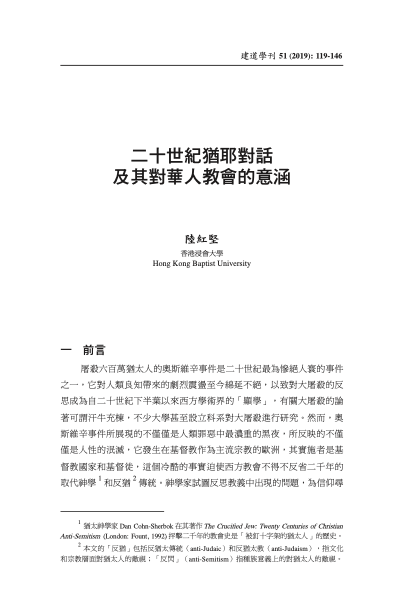二十世紀猶耶對話及其對華人教會的意涵/陸紅堅
陸紅堅
撮要
奧斯維辛大屠殺的發生,引發西方教會和神學家對影響教會近兩千年的反猶主義 / 取代神學的反思和批判,並開啟了二十世紀猶耶對話的大門。這些反思和批判歷經半個多世紀,已成為西方的「顯學」,它不僅重新構建了教會與猶太人和猶太教的關係,更重要的是,它深入探討了基督教所信仰的以色列的上帝、耶穌的猶太性、保羅與律法(妥拉)、猶太人的救贖 、基督教的猶太根源等重大議題,對基督教信仰進行全面的重估和重構,堪稱二十世紀神學、乃至二千年神學的重大轉捩點。本文試圖從神學反省、釋經批判、教會立場三個層面對這一顯學作出回顧與剖析,希望能引起華人教會的重視,並嘗試探討猶耶對話對華人教會的意涵。
ABSTRACT
The Auschwitz Massacre triggered serious reflection and criticism from Western churches and theologians on the anti-Judaism and replacement theology which has dominated the Church for two thousand years and initiated a Jewish-Christian dialogue in 20th century. These post-Holocaust reflection and criticism have continued for more than half a century and have become a prominent subject in the Western world. It not only has rebuilt the relationship between Jews, Judaism and the Church, but also most importantly, it has comprehensively reevaluated and reformulated comprehensively the Christian faith by theologically exploring the doctrines of the God of Israel, the Jewishness of Jesus, Paul and the law (Torah), the salvation of the Jews, the Hebrew roots of Christianity, etc. It has turned into a significant theological milestone for the 20th century and even the two thousand year old Church history. This article is attempting to make a retrospective observational study on it from the three dimensions: theological reflection, biblical interpretation and the church statements. The purpose is to draw the Chinese churches attention to this significant subject and also try to explore its implications for Chinese Christian ministry.
原載於《建道學刊》51期(2019年1月),頁 119-146。
最新文章
新手牧者研究計劃(三):新手牧者的身心靈狀態 / 盧慧儀
2025 年 11 月 19 日
個體與關係:滕近輝思想中「深化」的靈性觀 / 倪步曉
2025 年 11 月 18 日
香港九龍塘基督教中華宣道會之起源和發展史/陳智衡
2025 年 10 月 20 日
编辑精选
[電子書]困境與抉擇:「建道研究中心30週年誌慶」跨學科研討會論文集/廖炳堂、倪步曉主編
2025 年 1 月 2 日
從梧州到長洲:建道神學院125年的挑戰與恩典 / 陳智衡
2023 年 10 月 1 日
微小教會的見證/高銘謙
2023 年 6 月 1 日







